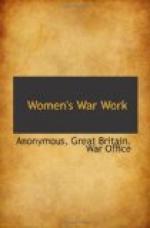In this war our men, in their dealings with us, have got down more and more to simple fundamental truths and facts—loyalty and comradeship, founded on our common patriotism. We have got nearer and nearer to the ideal so many of us long for, equal right to serve and help. The great fundamental establishment of political rights for women has come with us. When war broke out, women’s suffrage was winning all the time a greater and greater mass of adherents, a majority of the House was pledged to vote for it and had been for years, the Trade Unions and Labour Party stood solid for it, but the motive to act seemed lacking.
War came, and every political party in our country laid aside political agitation. No party meetings have been held since August, 1914. Suffragists and anti-suffragists did the same. The great body of constitutional suffragists kept their organization intact but used it for “sustaining the vital energies of the nation.” Relief Work, Hospital Work and Supplies, Child Welfare, Comforts, Workrooms, help for professional women, work for Belgian refugees, work in canteens and huts, work for the Soldiers and Sailors Families’ Association, Schools for Mothers, Girls’ Clubs—into everything the Suffrage societies fling themselves with ardour, zeal and ability. No women knew better how to organize, no women better how to educate and win help. They formed an admirable Women’s Interests Committee, and looked after all women’s interests excellently.
When the Government issued its first appeal for women volunteers for munitions and land, etc., it asked the Suffrage societies to circulate them and to help them to secure the needed labour from women.
As the war went on it became clearer and clearer that the men of the country saw more and more vividly why suffragists had asked for votes—and more and more were impressed with the value of their work. At meetings to do propaganda for Government appeals, when women spoke on the needs of the country, men everywhere, although it had nothing to do with the appeal, and had never been mentioned, declared their conversion to Women’s Suffrage in the War.
Women pointed out that they did not want Women’s Suffrage as a reward—but as a simple right. They had not worked for a reward, but for their country, as any citizen would, but, in our country, the great converting power is practical proof of value and they had that overwhelmingly in our work. The Press came out practically solidly for Women’s Suffrage. The work of women was praised in every paper and one declared, “It cannot be tolerable that we should return to the old struggle about admitting them to the franchise.” Eminent Anti-Suffragists, inside and outside of the House of Commons, frankly admitted their conversion. Mr. Asquith, the old enemy of Women’s Suffrage, said in a memorable speech: “They presented to me not only a reasonable, but, I think, from their point of view, an unanswerable case.... They say that when the




